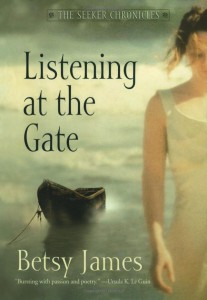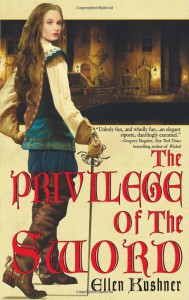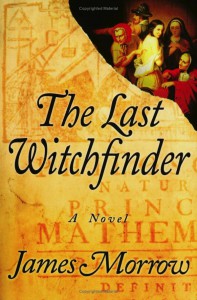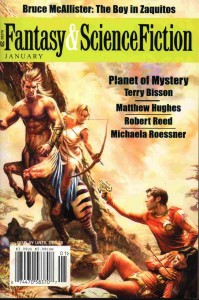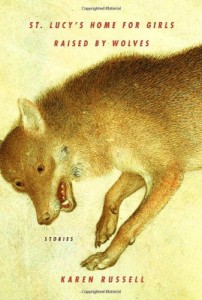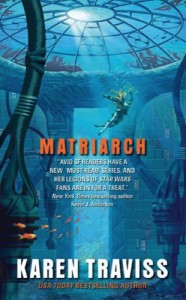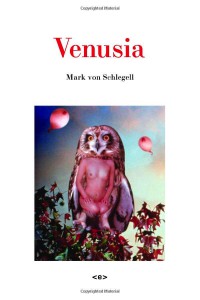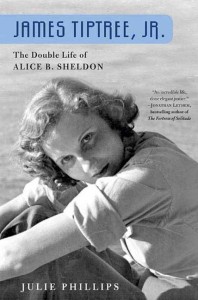The Otherwise Award is pleased to announce that the award ceremony for the 2006 Otherwise Award winner(s) has been held, and the winners have received their award and accolades.
Award Information
Conference Information
- Award Year: 2006
- Award Year Number: Year 16
- Conference: WisCon 31
- Date: 28-05-2007
- Location: Madison, WI
Award Sections
Award Winners
The 2006 jury chose 2 works for the Otherwise Award.
“A spectacular book. Jackson uses the science fictional conceit – conjoined twins born in large numbers after the A-Bomb testing in the 1950s – to explore both sympathetically and satirically all the negotiations in the women’s movement, in gay-lesbian-bisexual-transgender movements, in other rights movements – separatist, solidarity, identity, integration, etc.” –Joan Gordon “A remarkable novel, blending a surreal post-apocalyptic landscape with the symbolism of women’s fairy tales, the modern obsession with self-help books, and the quest for identity. Two girls, conjoined in one body, re-interpret “Donkeyskin,” a tale of violence and sexual awakening, while the world struggles to redefine what it means to be human in the long, penitential shadow of ground zero. Jackson’s vision is mythic, written in the body, and damn funny at times.” –Midori Snyder “Jackson’s speculation on Hiroshima and Nagasaki makes the novel more philosophical, inviting us to meditate on what will happen to sexuality and ethnicity in the post-nuclear future.” — Takayuki Tatsumi “The structure … is brilliant, stories within stories, looping around and following through one another. On the surface it’s a girl telling fairy tales a la 1001 nights, but the tales are influenced by worldwide story-telling traditions, and the roles of men, women, heroes, villains, animals, mythic beings, gods, etc., are constantly being subverted, upended, tweaked, so that gender and sexuality are more liquid than solid.” — Joan Gordon “At first I balked at reading a work that, on the surface, seemed to be a fairy tale wannabe, but within a few pages Catherynne Valente’s amazing vision literally took my breath away. Within three chapters, I was intrigued and thoroughly entertained. Within 70 pages, I was stunned at Valente’s ability to subvert the conventions of the fairy tale. Nothing is simple in this amazing collage of interconnected tales. No villain is two dimensional and no hero is pure or even necessarily engaged in good works. I don’t read fairy tales for fun, yet these characters are flesh-and-blood people who engaged me. “Gender is examined, held up to the light, peered at, taken apart and examined again as characters literally change shape and sometimes gender. For me, though, what makes Orphan’s Tales such an outstanding Tiptree winner is Valente’s ruthless exploration of the fairy tale. We not only see each story from the point of view of the hero, but also from the villain’s point of view, and the “fair” maiden’s point of view and the viewpoint of many other characters. Each character’s story leads to another’s story as the reader falls through layer after layer of understanding until she hits bottom and learns that all the myths of all the fairy tales are flat-out wrong. For example, what Valente does with the classic tale of a noble prince on a quest to rescue a fair maiden is alternately hilarious, tragic and deeply moving.” –Diane Silver “Valente has proven herself a prodigious successor to that other heroic storyteller, Shah’razad. This gorgeous novel of intricately interwoven stories delights and enchants with its innovation and seemingly-endless source of imagination. The orphan, the novel’s primary storyteller, is feral child who lives in the lush palace gardens. Her smudged eyes are ringed with miniscule tattooed words, the “printed” source of her tales. A young prince provides a rapt audience of one, captivated, terrified, and thrilled (just as we are) by the force of the girl’s stories. Valente gives us familiar tales from around the world, but twists them into new, unexpected shapes that challenge what we assume about heroes and heroines, about rites of passage, and about women and men.” –Midori Snyder “Jackson’s speculation on Hiroshima and Nagasaki makes the novel more philosophical, inviting us to meditate on what will happen to sexuality and ethnicity in the post-nuclear future.” –Takayuki Tatsumi “I loved the central conceit of this book, the girl with stories written so thickly and blackly around her eyes that it masked her and marked her and banished her. I loved the way the characters in the interweaving tales – male and female both – acted according to their own nature, which may or may not have been in accordance with the expected roles within their vast and varied cultures. The storytelling allowed both explicit examination of the roles and their responses to them and nearly invisible implicit revelations. I am going to the bookstore to pre-order the next in the series.” –Laurel WinterHalf Life by Shelley Jackson (Harper Collins, 2006)
Work Information
Title: Half LifeAuthor: Shelley JacksonPublisher:
Publisher Name: Harper CollinsCountry: USYear: 2006The Orphan’s Tales: In the Night Garden by Catherynne M. Valente (Spectra Books, 2006)
Work Information
Title: The Orphan’s Tales: In the Night GardenAuthor: Catherynne M. ValentePublisher:
Publisher Name: Spectra BooksCountry: USYear: 2006
Award Honor List
See full details about the 2006 Honor List
The 2006 jury chose 9 works for the Honor List “Like The Orphan’s Tales, Mindscape is a deeply layered work. Reading Hairston’s novel is like falling through the layers of the Earth. The truth you find at the core is startling and utterly different than the appearance of the surface. Beginning with a seemingly too-hip, flashy series of scenes where the characters appear to be two dimensional, Mindscape sinks down through layer after layer of meaning. In doing so, the book explores the people, politics and wildly contradictory cultures of a future Earth where the world is literally divided by impenetrable barriers. “Most delightful about Mindscape is Hairston’s in-depth study of the six viewpoint characters. No one is who he or she seems to be. In the process of telling their stories, issues of gender and race are examined in a matter-of-fact way that takes what could be stilted politics and turns it into story. Two-thirds of the way through the novel, Hairston succeeded in literally jerking me out of the lazy stereotypes I had built up around one character and, in the process, changed how I viewed what a woman or man could think or do.” —Diane Silver “This book doesn’t so much explore gender as it inhabits it in a new way. Through the protagonists of Kat and Nall, James shows us what men and women can be when they are not limited by gender expectations. Both come from cultures with traditional male/female gender roles. However, both also have contact with individuals or cultures that help the two characters break out of the norm. Nall, the male, and Kat, the female, are able to act in ways that can be seen as either male or female. “If you define a hero as a super-competent man who acts when others wait passively, if the hero is a male who slays the monster, reveals the hidden truth or changes society, then both Kat and Nall are men. If a man is someone who is a leader, than both are men. If a man is someone who isn’t afraid of physical challenges, then both are men. “At the same time, if emotions and the open display of them are female, then both Nall and Kat are women. If spirituality is seen as the kingdom of women, then both are women. If intuition is a woman’s talent, then both Nall and Kat are women. “Listening at the Gate also enthralled me with its simplicity of style and its lyrical evocation of mountain and sea. I also loved James’ refusal to portray her heroes as perfect. This book reminded me of why I love reading.” —Diane Silver “I do not live in the world of Ellen Kushner’s duels and dukes. Her exploration of gender roles is so deep and true, though, that reading this book transported me back to my own childhood in the Fifties and Sixties. “Kushner constructs a fascinating portrait of a young woman’s awakening to gender roles in a society where all choices are limited by gender. I was particularly taken by the emotional and physical journey Katherine takes as she is forced to put aside her female clothing and life and take on the clothes, training and role of a man. The fact that Kushner does all of this while also constructing a dashing adventure makes this an even more delightful read. “By the end of the book, Katherine has emerged as a different kind of human being — one that may never have appeared in her world before. Perhaps most important, she has thrown off the perspectives of the men who rule her society and begun to view the world through her own eyes. As a 20th Century woman who grew up in a Midwestern household without a sword in sight, I remember well what it was like to take that kind of journey.” —Diane Silver “Ellen Kushner brings these gender-bending characters to life in such a well-detailed world we think we could live there. I love the complexity of their various explorations of the intrigue that is the world of the sword.” —Laurel Winter “Morrow’s The Last Witchfinder is a wonderful novel. The narrator is Newton’s Principia Mathematica who is enamored of the heroine, whose life he traces from her childhood being taught cutting edge (for the 18th c) science by her aunt, through her aunt’s execution for witchcraft, through her picaresque adventures involving native Americans and Ben Franklin, as she quests to end witch hunting through the power of reason. The characterization of woman as strong, scientifically wise, and sexually liberated not only as a young but as an older person, offers terrific role models. The re-visioning/secret history aspect, inserting women into a history from which they have been excised, is pretty neat too.” —Joan Gordon “I liked this story because it explores how women imagine and manage their empowerment in a variety of ways.” —Joan Gordon “Through parallel tales of myth and modern life, Michaela Roessner paints a stark picture of what happens to women who fail to conform to social norms. I found this story to be quite bleak, but was buoyed by the end where the narrator takes up a “blade” – perhaps real, perhaps symbolic – to fight for the horse-year women and, possibly, for all women in the world.” —Diane Silver “How fascinating and direct. The depiction of the horse year women, past and present, is presented in a way that cuts deeply without being sentimental in any way. Great language and concept.” —Laurel Winter “This collection contains short stories that have in common surreal or fantastic elements, kids alone or abandoned, ghosts, unresolved endings, missing mothers, and first person narration. Only the last story, the title story, really looks at gender, since girls raised by wolves aren’t very girlish by common cultural standards, although they may be by wolf cultural standards.” —Joan Gordon “How can you not love a story where the very human girls are ‘all hair and snarl and floor-thumping joy’ and where they make their convent school less alien by ‘spraying exuberant yellow streams all over the bunks?’ Such are the protagonists of Karen Russell’s story, ‘St. Lucy’s Home for Girls Raised by Wolves.’ Once again transformation is the theme as the girls are cajoled, molded and forced into human ideas of femininity.” “I was equally enchanted by the girls of ‘Ava Wrestles the Alligator,’ a tale where young women take risks and transform in such unladylike ways.” —Diane Silver “Karen Russell’s collection of wonderful short stories is reminiscent of the subtle magic realism of Kevin Brockmeier. Most of these tales are set in strange backwater towns, where precocious children observe the strange rituals of adults and older siblings. A plucky young girl wrestles alligators for tourists and saves an older sister from her nightly romps in the deadly swamp with a succubus. Two brothers, wearing three-d glasses that allow them to see ghosts, search stagnant lagoons in search of the ghost of their drowned sister; and packs of wild girls are gathered into dormitories where they must be forced to shed their raucous, and gleefully wolfish natures and become domesticated young women.” —Midori Snyder “I was in love with this story from the title. With modern, literary sensibilities, Karen Russell shows the acculturation and feminization of the young women in question. We then can question and celebrate both the success and ‘failure.'” —Laurel Winter “I really love this series, and it’s very rich in ideas about the human/animal interface, which is often a place where sexuality and gender are also explored. That is definitely happening in Matriarch, the fourth in the series. The different species of sentient beings in this series of novels have different ways of negotiating sexual difference and that all has implications for human negotiation of sexuality and gender, of course. The writing is transparent and skillful, and the plotting is compelling. Traviss also blends some romance genre into the mix. The result is compulsively readable.” —Joan Gordon “The fourth book in Karen Traviss’ fascinating Wess’har Wars series, Matriarch takes us further into the society of the wess’har and into the life of the human protagonist, Shan Frankland. In this realm, macho and the concept of dominance take on a decidedly female bent. Frankland and her two very muscular, totally warrior husbands give the concept of family roles and gender a whole new meaning. A great book. I can’t wait to see where the series goes. Traviss’ work may well be a contender for the Tiptree Award itself once the series is completed.” —Diane Silver “Traviss does an amazing job of giving enough detail that readers—such as me—who are not familiar with the series can catch up without bogging down. Excellent world-building. I love the idea of the alien culture where the females can inadvertantly ascend to positions of authority. Good exploration of gender roles in humans and aliens.” —Laurel Winter “Von Schlegell’s very dense speculative fiction Venusa is very naturally considered as homage to Phil Dick, J.G. Ballard, and George Orwell. Indeed, insofar as the science fictional gadgets are concerned, this novel deals with the Ballardian sentient plants, the Dickian artificial reality, and the Orwellian hyper-bureaucracy. The author has the creative ability of producing my favorite type stories, though the end product is not satisfactory. And yet, it is also true that von Schlegell foregrounds the feminist perspective by featuring the intriguing characters such as Dr. Sylvia Yang and Martha Dobbs. If we take into account Tiptree’s own admiration of and friendship with Dick as is clear from their 1969 correspondence, Venusia seems worth consideration.” This kind of special award is unusual for the Tiptree Award, which focuses on fiction. But the jury could not ignore Phillips’ fine work and excellent scholarship, detailing the remarkable life of the remarkable woman for whom the award is named.Mindscape, Andrea Hairston (Aqueduct Press, US, 2006)
Listening at the Gate, The Seeker Chronicles Book 3, Betsy James (Atheneum, US, 2006)
“A beautiful and mythic Young Adult novel. James creates a complex tale of dualities as two children from two different cultures struggle for identity. Escaping patriarchy, Kat is raised by her aunt in the Upslope world of the forests and farms, while Nall, a young man washed ashore from a Selkie island, is an outcast whose sealskin has been destroyed. Both young adults confront the rigidity of their cultures – with terrible and world changing results. James illustrates each chapter with small, elegant woodcuts, and incorporates fragments of poetry and children’s songs which act as poignant commentary on adult conventions.” —Midori Snyder
“I love this book. I found the language interesting and adept and organic to the characters and the characters themselves complex and unique. It is more about identity within culture and within a relationship (Nall & Kat) than it is about gender specifically, but it does explore women’s and men’s roles within several different cultures.” —Laurel WinterThe Privilege of the Sword, The World of Riverside Book 3, Ellen Kushner (Spectra, US, 2006)
The Last Witchfinder, James Morrow (William Morrow / HarperCollins, US, 2006)
“A diabolical novel of witch hunts, Newton’s mathematics and Aristotle’s elementals. It chronicles the life of an 18th century woman, Jennet Sterne Compton, the rebellious daughter of a Royal witchfinder. Using science and philosophy, Jennet sets out to refute and repeal the Witchcraft Acts that led to the persecution of innocent women. Jennet’s remarkable life is filled with lusty adventures, danger, and a dazzling array of interesting men. Morrow’s research and rich historical detail is fascinating (Jennet Compton is an American Moll Flanders), moving through a turbulent and unforgiving world on her own terms.” —Midori Snyder
“I enjoyed reading Morrow’s entertaining alternate history The Last Witchfinder. This pre-modern transatlantic adventure of the female natural philosopher Jennet offers a unique reading of Isaac Newton and the heroine’s affair with Ben Franklin and a tragic-comical representation of Salem witch trials. The author is deeply knowledgeable about the history of Colonial New England. What impresses me especially is his description of a young Ben Franklin not only as a gender bender using the pseudonym of the proto-feminist widow Silence Dogood, whose writings Jennet adored (256), but also as a race bender or ethnic transvestite disguising himself as the Indian Chief Ephemero, who succeeds in rescuing the heroine: “Indian disguises were by far the most common subterfuges employed by dissident American patriots during the Colonial era”(488). Yes, Ben Franklin’s various and very often female personae encourage us to redefine him not only as the modern Prometheus, that is, the precursor of Dr. Frankenstein, but also as a computer hacker constantly changing and reinventing his identities in cyberspace. What with the heroine Jennet’s proto-modern and natural philosophy not incompatible with Ben Franklin’s gender politics and what with a radical re-narrativization of Salem witch trials leading to the rise of modern feminist culture, The Last Witchfinder anachronistically gives us a number of clues to reconsider today’s problems of gender and sexuality.” —Takayuki TatsumiHorse-Year Women, Michaela Roessner (Spilogale, Inc., US, 2006)
St. Lucy's Home for Girls Raised by Wolves, Karen Russell (Alfred A. Knopf, US, 2006)
Matriarch, The Wess'har Wars Book 4, Karen Traviss (Eos Books, US, 2006)
Venusia, System Series Book 1, Mark von Schlegell (Semiotext(e), US, 2005)
Special Honor
James Tiptree, Jr.: The Double Life of Alice B. Sheldon, Julie Phillips (St. Martin's Press, U.S., 2006)
Jurors
- Midori Snyder (chair)
- Joan Gordon
- Diane Silver
- Takayuki Tatsumi
- Laurel Winter
Award Ceremony
See full details about the 2006 Ceremony
The 2006 Otherwise Award was given to Shelley Jackson and Catherynne M. Valente at WisCon 31, May 28, 2007, in Madison, Wisconsin.




